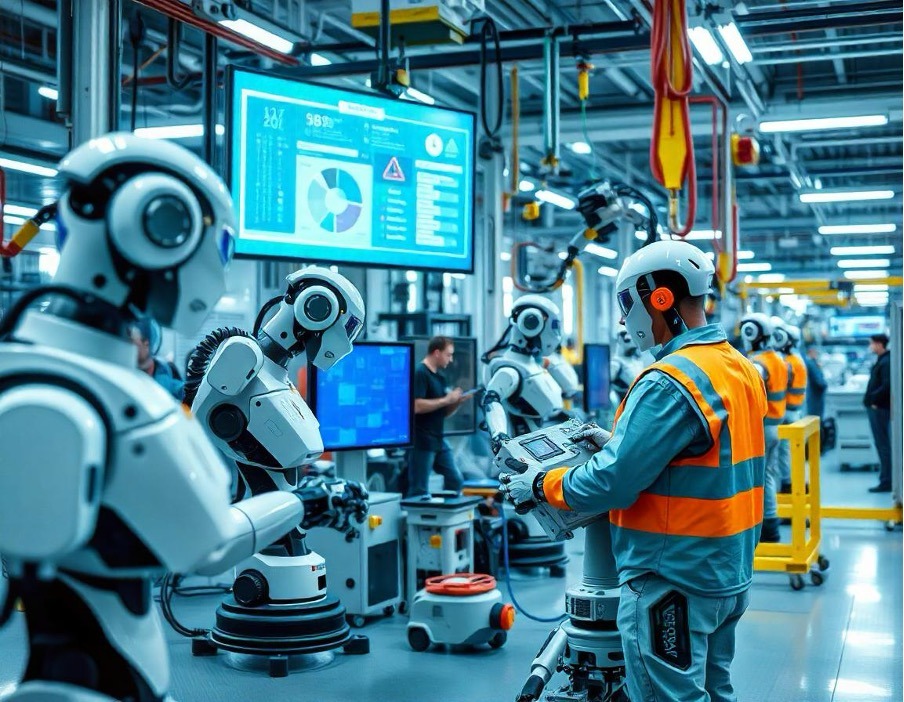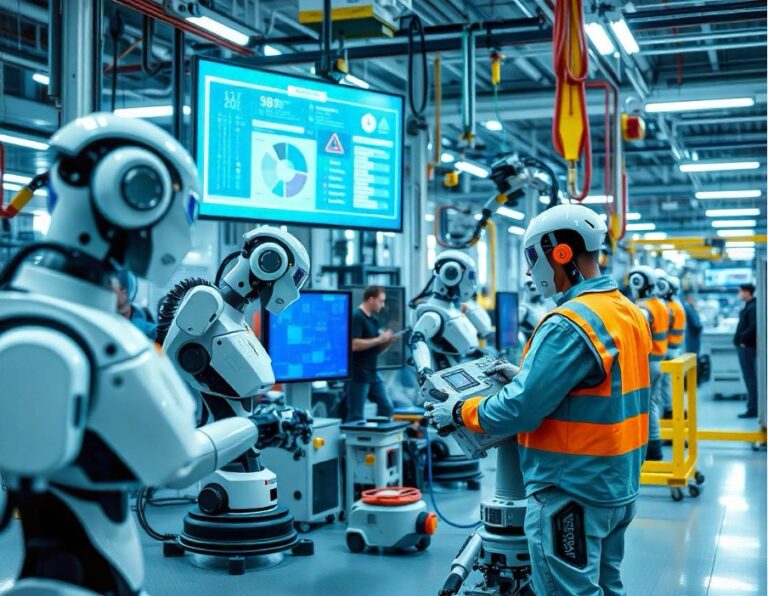Artificial Intelligence has stormed into global markets, including our own – the domestic one. Have you already considered the potential AI brings in the context of developing your manufacturing plant? After all, this technology is not just a tool for entertainment – it holds far greater possibilities. Artificial Intelligence can radically impact the operations of businesses, especially in the B2B sector. In today’s article, we would like to give you a detailed overview of how AI can change and support your business.
Artificial Intelligence – basic principles and how it works
Artificial Intelligence supports the rapid analysis of data. As a result, for example, machines can make decisions based on the filtered information they receive. In practice (in a simplified manner), machines equipped with AI “learn” based on the facts provided to them. They then draw conclusions from this data and take action accordingly.
However, for this to happen effectively, AI needs an appropriate database – one that is accurate and precise, to avoid drawing incorrect conclusions. Just like a person who receives incorrect information and learns to perform tasks incorrectly, AI will also malfunction without proper knowledge. Therefore, the foundation is creating a bank of precise content that will allow this technology’s potential to be fully realized.
Key areas and benefits of applying AI in industry
It’s impossible to ignore that the AI market is growing at a lightning pace. Research by Next Move Strategy Consulting indicates that by 2030, it could reach a value of up to 1.85 bilion dollars. This impressive estimate clearly shows the enormous potential within AI. The technology is attracting increasing attention from investors and businesses across various sectors. But why are so many companies investing in it? Enterprises see artificial intelligence as a key to innovation and competitive advantage, and the answer to the previous question lies in three key layers.
- 1. Data – this is the foundation of AI’s operation. Through data, the technology can learn. The more accurate, complete, and detailed the data is, the better the results we will obtain.
- 2. Algorithms – they dictate what actions should be taken and in what order to achieve the desired outcomes. They are responsible for processing the data and making decisions based on it.
- 3. Interface – this is, in a way, the method by which AI communicates with the end user or machine. It allows humans and other systems to understand and utilize the information.
Manufacturing plants generate and collect vast amounts of data. This data comes from sensors, machines, and warehouse processes, among other sources. AI enables faster and more efficient processing of this data, ultimately improving work optimization. The technology allows for real-time monitoring and adjustment of many parameters. This is especially important in factories where production processes are continuous – for example, in chemical or food production companies.

Artificial Intelligence for everyone – a breakthrough in technology accessibility
Undoubtedly, 2023 has proven to be a breakthrough year in terms of AI accessibility and knowledge. Never before has it been easier to engage in dialogue with AI, use it in production, and obtain business-relevant results.
AI is now more accessible and affordable than ever. This has largely been made possible by the reduction in data storage costs (migration to the cloud) and the increase in server computing power. The outcome of these advancements has also been the rapid development of technology across many dimensions.
Embrace robotics with AI
In the area of process automation, artificial intelligence has brought equally significant changes. Now, production machines can independently adapt to dynamic working conditions in real time. Operations thus become more flexible and efficient, thanks to the immediate response to variable parameters related to manufacturing goods. Currently, this is one of the most developed areas where AI technology finds its applications.
Machines no longer need to be programmed manually, require less frequent maintenance, and break down less often. They can independently adjust settings for different sizes and shapes of items on the production line. As a result, processes become less time-consuming and more versatile.
Knowledge transfer and Artificial Intelligence – the evolution of training
AI can also significantly change how companies conduct their training or share knowledge. One example is creating databases for employees, containing documents and instructions that are easily accessible to everyone, including on mobile devices (such as tablets). With the use of language models, staff can instantly retrieve the information they need. Employees no longer have to sift through thousands of documents or ask dozens of people.
Imagine a new employee at a manufacturing company. To start performing tasks efficiently, they need to quickly acquire knowledge about numerous processes. Without AI, they would have to sift through hundreds of pages of documentation, read books, or go through volumes of instructions. Now, all they need to do is ask AI the right question. They will instantly receive a precise answer, saving time and increasing efficiency. They can also tailor the response to their needs, making learning and information acquisition easier.
AI – optimizing production through automated data analysis

During production processes, vast amounts of data are generated. These include reports on pressure, temperature, energy consumption, and quality parameters. Manually analyzing such information resources is practically impossible. This is where AI steps in, as it can automatically interpret this data. It identifies potential issues and optimization opportunities. It also finds bottlenecks or areas where efficiency can be increased. Companies can quickly respond to changes and instantly optimize processes. Everything happens in real time, allowing not only for improved efficiency but also for significant cost reductions.
Convenient production planning with the support of Artificial Intelligence
The applications of AI in industry certainly do not stop at data analysis. It also offers wide-ranging possibilities for automating production processes. Thanks to its algorithms, AI can, for instance, autonomously plan production, maximizing its efficiency while minimizing operational costs. Artificial intelligence takes all available factors into account – raw material resources, machine capacity, and operator working hours. Based on this information, it generates an optimal production schedule, enabling precise and dynamic management. As a result, AI becomes a key tool in managing raw materials and industrial processes, enhancing the efficiency and competitiveness of companies in the manufacturing sector.
Does AI offer the ideal solutions for your plant?
Nowadays, almost every entrepreneur will eventually face the question – should my company invest in artificial intelligence? The decision to implement AI really depends on many factors, particularly the specific nature of the business. This technology is especially well-suited for plants that work with large data sets and require flexibility or those that need to respond quickly to changes. In such facilities, its implementation can bring measurable benefits.
However, it’s important to remember that AI is not always the best solution. Especially if the scale of a company’s production is very small, doesn’t require dynamic adjustments, or doesn’t demand high-speed operations. As with any major transformation, it’s crucial to understand in which areas the technology can bring real advantages before proceeding with its implementation.

Artificial Intelligence as the key to Industry 4.0 goals
AI opens up a vast array of new possibilities for companies, particularly in the context of automating production processes and content analysis. Therefore, if you operate a business that deals with large sets of information or are looking for ways to increase efficiency, AI might be the best choice for you. The key to success in this case will be well-prepared databases and precise algorithms.

AI in business specifically
You can find more about artificial intelligence in the latest podcast from Digitalizuj.pl. We warmly invite you to listen to it and subscribe. It’s also worth checking out the other episodes to stay up to date with the possibilities that modern technologies offer us.


